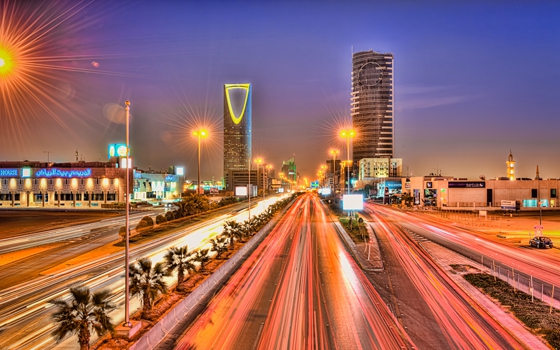After decades of government-led growth, Saudi Arabia is handing over much of the responsibility for the economy to private firms – a prospect which both pleases and worries businessmen, who wonder how they can finance new projects in an age of austerity.
As more than a dozen Saudi ministers outlined the kingdom's economic reform plan in late-night news conferences last week, they praised the private sector in terms that would have suited right-of-center Western politicians rather than those from a state-dominated economy.
The economy minister said removing obstacles to private firms was a priority. The health and education ministers called for flows of private money into their sectors. The minister of municipal and rural affairs said his officials would become "regulators, planners and controllers", leaving private capital to develop Saudi cities.
Such events would be a sea change for Saudi Arabia, which for decades has relied on lavish government spending of petrodollars for growth.
Deputy Crown Prince Mohammed bin Salman, now promoting the reform plan on a visit to the US, compared it in a magazine interview early this year to the free-market revolution overseen by 1980s British prime minister Margaret Thatcher.
The prospect excites some Saudi investors – the share prices of several local companies that could benefit from opportunities created by the plan have jumped since last week.
"It will be a positive challenge and will bring a big change even if only 60 or 50 percent of the plan is achieved," Muhammad Al-Agil, chairman of major Saudi retail chain Jarir Marketing Co, told Reuters.
"For the private sector, it will multiply the opportunities where private capital and private sector resources will be deployed."
Others, however, worry about whether officials can make the regulatory environment for private firms attractive enough, the risk of waste and corruption as the government opens tens of billions of dollars of projects to the private sector, and private investors' ability to finance their projects.
"When it comes to the strategy I am optimistic about the opportunities that are being presented…But when it comes to implementation, this is where I am uneasy," said the chief operating officer of a Saudi conglomerate, declining to be named because of the sensitivity of his remarks.
Ihsan Bu Hulaiga, a prominent Saudi economist, said that until the government gave crucial details of the terms on which private companies would be invited to invest, it would be hard to tell whether the private sector push would succeed.
"The private sector is opportunistic by nature – it needs to be convinced that investments are worth the money. So far the opportunity the government is presenting is not clear," he said.
SPENDING
Saudi Arabia is turning to the private sector because the government can no longer afford to keep increasing spending rapidly in an era of cheap oil and shrunken state revenues. It posted a record budget deficit of nearly $100 billion last year.
The reform plan envisages state spending of around SR270 billion ($72 billion) in the next five years on projects to diversify the economy beyond oil, from industrial zones and power stations to housing, schools and communications. The private sector would provide 40 percent of funding for the projects, or about $48 billion.
This is not impossible in an economy where the private sector's output was $320 billion last year alone. But with domestic money market rates rising sharply because of reduced flows of oil money into the banking system, it is not clear that local firms can raise funding at economic rates.
Another Saudi economist, Fadl Alboainain, said the local private sector probably did not have the capacity to take on some of the biggest projects by itself.
"Looking at the local banking sector you will find it suffering from shrinking liquidity, which leads to high margins and tight lending conditions – this will limit private sector financing capabilities," he said.
That implies Saudi Arabia will have to rely much more heavily on foreign investment in coming years – one reason why Prince Mohammed's delegation will meet business leaders on its visit to the US.
The reform plan aims to more than double annual foreign direct investment to $19 billion by 2020 from $8 billion last year, partly by making it simpler to do business in the kingdom. That will depend on a shake-up of sluggish state bureaucracies.
Since last week's reform announcement, two models for private sector investment have emerged. One is the outright sale of state assets; Riyadh is likely to start privatizing the postal system by early 2017, the communications minister said.
These sales may run into some of the same issues as Thatcher's privatizations. Saudi Postal Corp has over 10,000 staff; curbing employees' wages or staff numbers to make it attractive for privatization could be politically sensitive.
The other model is a partnership with the government in which private firms would stump up money for projects and earn revenues from operating them. State utility Saudi Electricity Co said it was inviting expressions of interest from firms to build two solar power plants and sell the electricity generated by them to it under long-term deals.
Shares in major Saudi property developer Dar Al Arkan are up 14 percent since the company said it was in talks with the ministry on a partnership to build housing.
Public-private partnerships have been used successfully in neighboring Oman for billions of dollars of power projects. But the Saudi projects are likely to be launched in a difficult environment as the government tries to balance its budget.
"The National Transformation Programme aims to raise non-oil revenues through fees, taxes and subsidy cuts. These are deterrents to the private sector," said Abdulwahab Abu Dahesh, another prominent Saudi economist.
Reuters
16 June

























































